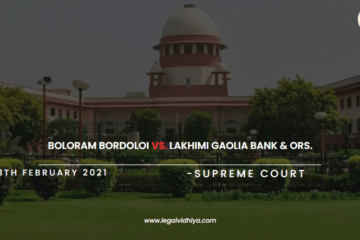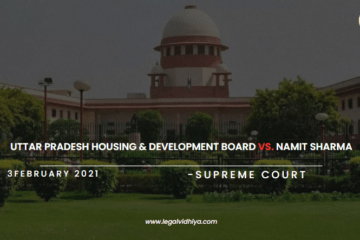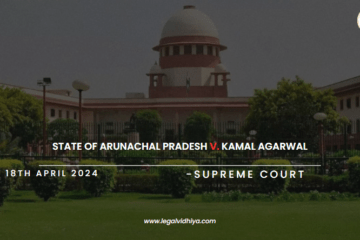
INTRODUCTION :
Name of the case : Krishna Kumar Singh & Anr. v. State of Bihar & Ors.
Court name : Supreme Court of India
Date of judgment : January 2, 2017
Citation : (2017) 3 SCC 1
Bench name : Hon’ble J. D.Y. Chandrachud, J. Sharad Bobde, J. A.K. Goel, J. U.U. Lalit, J. Nageswara Rao, J. Madan B. Lokur, J. Tirath Singh Thakur
On January 2, 2017, a seven-judge legitimate bench of The Honourable Apex Court issued its verdict in the presently pending case. One of the primary areas of discussion was the “re-promulgation of Ordinances” as well as the constitutionality of them. The Bihar government put into effect the “The State of Bihar Non-Government Sanskrit Educational institutions, (Taking Over of Administration and Control) Ordinance” in 1989.
429 private Sanskrit educational institutions have been gathered by the state, affirming this. The aforementioned law (ordinance, to be more precise) would give Bihar legitimacy over hiring professionals and other school personnel. Numerous other Ordinances were enacted after this one, but neither of them were sent to the state legislative body, so no regulations were passed as a result. A new ordinance was immediately implemented after the previous one lapsed.
SUMMARY OF THE FACTS :
On January 2, 2017, the constitutional panel of the Honourable the Supreme Court of India handed down its final ruling in this matter. The cases concentrated on whether the most recently promulgated Ordinances seemed constitutional.
The government of Bihar passed the state’s Non-Government Sanskrit Academies (Taking Over of Organisations and Control) Ordinance in 1989. This states that 429 private Sanskrit learning institutions have been considering government oversight. This Ordinance commanded that the state government step into and take over the tasks carried out by the teachers and other staff members of the school. Numerous additional Ordinances were enacted after the first one, but none of them were put forward to the State Legislature or encompassed in any later legislation.
In light of these Ordinances, faculty and other staff members of these educational institutions submitted requests in the Patna High Court, attempting to be government workers and asking for the getting reimbursed of salaries and additional types of compensation. The High Court was tasked to make an assessment regarding the validity of the aforementioned Ordinance’s seven subsequent re-promulgations and whether or not any constitutional contradictions existed with regards to them.
Referencing the court’s ruling in D.C. Wadhwa as well as Ors. versus the State of Bihar and Ors., the High Court of Patna, India eliminated the Writ Petition on its contention that the repeated reexamination of the Regulations was unlawful.
As a result, in 1998, a petition for review was put forward to a two-judge bench of the Supreme Court. The justices Sujata Manohar and D P Wadhwa’s bench also decided that it was unlawful for municipalities to issue ordinances again.
They disagreed and had distinct views regarding the constitutionality of the first Ordinance, so a three-judge bench was chosen to hear the case. Because the case raised noteworthy constitutional problems, this three-judge bench subsequently referred the situation to a five-judge bench in 1999. On November 23, 2004, this case was given to a more extensive Bench of seven judges.
In accordance with the ruling rendered by the seven-judge Constitutional Bench of the Supreme Court of India on January 2, 2017, the promulgation of ordinances is an infringement of the Constitution of India and erodes legally binding legislative processes. In addition, the Court ruled that the passage of an Ordinance by the Governor in accordance with Article 213 and that of the President of India in relation to Article 123 is not immunized from review by the judiciary.
ISSUES RAISED :
Does the 213th article of the Constitution mandate that the Executive consistently complete an Ordinance for consideration by the Legislature?
Is it possible an Ordinance be re-promulgated according to the Constitution?
When an ordinance is discontinued in leverage, is a behavior taken in obedience to it still valid?
In the previously mentioned circumstance, did the Parliament abuse the authority it had to implement ordinances?
Was the law actually followed when the government of Bihar implemented its ordinances?
Following the time that the Ordinance had been repealed, did the people who filed the petition still have any constitutional standing?
Even though the Ordinance has been eliminated, can the Respondent nevertheless be attempted and handed down for violating it?
CONTENTIONS FROM BOTH THE SIDES :
The biggest point of disagreement in this case between each of the sides was the legitimacy of the ordinances which the executive branch had earlier repeatedly propagated.
In the present instance, the appellants sought compensation according to the previously mentioned Ordinances. The appellants apprised the Supreme Court of that they were entitled to ask for earnings and other paychecks from the Government of the State of Bihar in light of the classification of “government employees” conferred upon them by the foregoing Ordinances.
They suggested that they had the right to get a salary and other amenities provided by the government as of the day that when the initial Ordinance (Ordinance 32 of 1989) was implemented, and that they ought to have the right to keep receiving those benefits even after the final set of Ordinances had run its course.
The respondents’ main research continues to fretting the likelihood that the effects and results associated with choices made in conformity with an Ordinance before it ceased to be in force as an aftermath of being denounced by the Assembly of Legislative bodies would be of any assistance or would disappear in its entirety.
They indicated that they would not be held liable for remuneration administrators and other staff members whose work concentrated in Sanskrit educational establishments if the Ordinances demonstrated to be insufficiently trustworthy.
JUDGMENT OF THE CASE :
The Supreme Court of India handed down an important ruling on the constitutional significance of re-promulgating ordinances that were researched in comprehensive detail to address every pertinent question. The Honourable Bench ruled that unimpeded re-promulgation of Ordinances became unconstitutional in a 5:2 vote.
Articles 213 and 123 of the Indian Constitution give the office of president or governor the power to issue Ordinances, also referred to as absolute orders, which enable government agencies to put into effect regulations without additionally a body of lawmakers.
In this case, the Honourable Bench reached the conclusion that judicial review is an option for the President’s as well as the Governor’s specific powers. It also stated that promulgating new ordinances without first introducing them before the legislature is detrimental to democracy.
Even though a regulation temporarily has the same dimensions and effect as a law, it does not give the president or governor different autonomous power through legislation. Furthermore, Article 213 itself mandated a mandatory constitutional requirement on the government for submitting the Ordinance to the Legislature.
The legislative branch must decide the following: i. The importance, validity, and timeliness of transferring the Ordinance;
ii. if the Ordinance necessitate acknowledgment;
iii. Whether a piece of legislation must be passed to allow for the ordinance to be put into implementation.
The Court placed a special focus on the DC Wadhwa v. State of Bihar selection, which found that the re-promulgation of Regulations was considered an infringement of the Constitution. The Constitution specifically forbids re-promulgation for the reason that follows two main reasons:
The legislative branch must decide the following: i. The importance, validity, and timeliness of transferring the Ordinance;
ii. if the Ordinance necessitate acknowledgment;
iii. Whether a piece of legislation must be passed to allow for the ordinance to be put into implementation.
The Court placed a special focus on the DC Wadhwa v. State of Bihar selection, which found that the re-promulgation of Regulations was considered an infringement of the Constitution. The Constitution specifically forbids re-promulgation for the reason that follows two main reasons:
An act like that seeks to work together with the legislatures, which happens to be the primary organization with the responsibility of making regulations; and
It contravenes Articles 123 and 213, which set forth stipulations on having the power to promulgate statutes.
The compensation that was previously paid by the Government was not required to be recuperated from the teachers, even though the court’s decision determined that all the Ordinances are composed of an infringement on the Constitution due to the fact that they failed to be submitted to the Legislature, were re-promulgated in contravention of the ruling in the matter of D.C. Wadhwa, and did not provide the status of ” The government employee” towards the teachers.
The words “cease to continue operating in the two articles 123 and 213 are not intended to imply that the Ordinance develops into void right away once the legislature gets back together for a six-week session or after an affirmative vote of disapproval is passed. The specific conditions whereby an Ordinance will become void are outlined independently in Articles 123 and 213.
CONCLUSION :
The legislative branch debate and deliberation is the fundamental building block of our democracy. The advancement of laws employing innovative thinking has been endorsed by the opposing side’s arguments and negotiations. When laws are intentionally passed via the Ordinance their journey when neither house is in session, the Constitution as well as its fundamental principles are exclusively undermined.
The Executive should be given the authorization to promulgate Ordinances at highly stringent surveillance and oversight to prevent conduct that is illegal, nevertheless given the momentous circumstances.
The decision in question broadened the purview of the judicial review of ordinances in order to promote taking responsibility in how the laws have been submitted. It enables the court system to use their review responsibility and validate the decision of the president and Governor’s actions in order to figure out whether or not the Ordinance really has been indispensable.
This is written by Rimi Agarwal of Manipal University, Jaipur, an intern under Legal Vidhiya






0 Comments